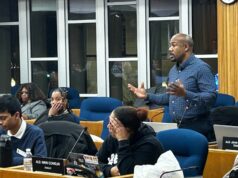Special promotional content provided by United Way of Dane County.

A man can’t stop using cocaine. Another isn’t sure whether his health insurance application has been processed. A man needs to know what food pantries are open today. Another says his unemployment payment was wrongly denied and wants to know what to do. An expectant mother needs to find an affordable two-bedroom apartment and could use some help with a deposit — but only speaks Spanish.
This is all within about a half hour on a normal Tuesday afternoon. These are all people who need help of one sort or another. These are all people who, unsure where to turn, picked up a phone and dialed 211 to reach the United Way 211 Center, where trained staff and volunteers were able to connect them with an addiction clinic and Narcotics Anonymous group, the state Badgercare office, food pantries, the state unemployment appeals process, and a few affordable housing agencies.
In other words, whatever you need help with, call 211.
“The goal is that for everyone calling in with different needs, we can connect them to an agency that can help,” says Rachel Gundacker, director of the United Way 211 Center.
Even if it’s more than one thing you need help with.
“A lot of times we get dual needs,” Gundacker says. “So, if someone’s having a hard time paying rent, most likely they’re also having a hard time paying their utilities or they might have some food insecurity attached to that need. So, at 211 we’re really looking at serving the whole client and all of the aspects of their needs.”
United Way 211 Center staff not only field about 90 calls every day, but also connect with local service agencies to make sure they can find the best fit for everyone who calls.
“It’s all very unique,” she says of the many service agencies around the region. “It takes a lot of time for our resource managers to really understand those systems and services and make sure that the way we’re collecting and reporting out on those resources is accurate and up to date.”
Gundacker says it’s important to know that the service is local, that it’s anonymous, and that you can call any time.
The Madison center serves Dane, Rock, Sauk, Iowa, Green and Lafayette and Columbia counties, and is connected to service providers in all of those communities. Gundacker calls it a “Hyperlocal service. Even our after hours providers still just in Milwaukee or La Crosse,” she adds.
You also don’t have to worry about your data being collected, Gundacker says.
“We ask a lot of questions, but we’re not collecting identifying information,” she says. “It’s a very anonymous service.”
Gundacker says staff ask a lot of questions like age or whether you have kids or whether you earn above or below a certain amount because different agencies serve different kinds of people, and 211 operators just need to match you with services that will meet your unique situation.
Anonymity has been especially important over the last couple years, Gundacker says, as some undocumented people might fear calling. In fact, Gundacker says, undocumented people can and do call for the same issues as anyone else — plus legal assistance with their immigration cases.
It also helps that United Way 211 can provide assistance in more than 300 languages using a translation service.
United Way 211 has recently expanded into the disaster relief business. Following the floods that crippled parts of Madison, United Way 211 worked with Dane County Emergency Management to collect information and coordinate FEMA claims.
“We had one of our staff people in the emergency command center,” Gundacker says. “He was there and he was just feeding us info, and as the people who are taking calls in real time we were able to just update that information.”
The United Way 211 Center is staffed by two full-time agents and at least one volunteer agent, though they all go through the same 40-hour training. That training is intensive but doesn’t even touch on the single most important trait in a 211 operator.
“Empathy is such a huge aspect of the work and it’s not something you can teach,” Gundacker says. “We’re really looking for that in who we’re hiring for staff and volunteers that they have that natural ability to connect with the caller and empathize with their situation.”
Volunteers serve half-day shifts, and Gundacker says the center can always use more. If you’re interested in volunteering just call — you guessed it — 211.
If you don’t have time to volunteer but would like to donate to this critical service, you can do so here.


































